冀教版七年级英语下册导学案(2020年整理).pptx
冀教版七年级英语下册lesson1导学案
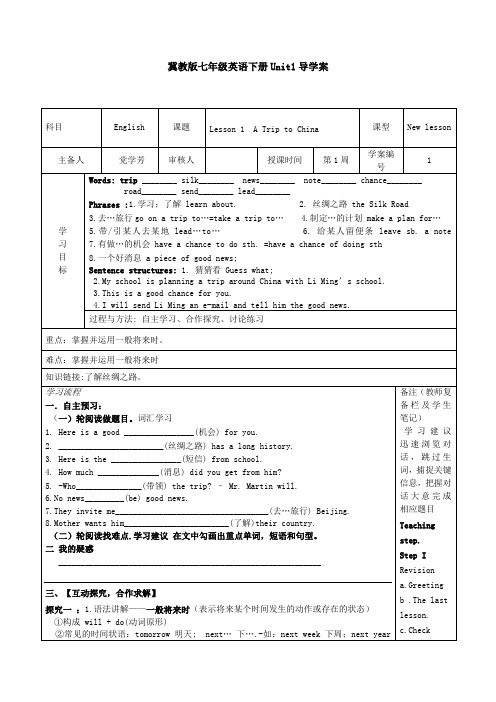
冀教版七年级英语下册Unit1导学案科目English 课题Lesson 1 A Trip to China 课型New lesson主备人党学芳审核人授课时间第1周学案编号1学习目标Words: trip ________ silk________ news________ note________ chance________road________ send________ lead________Phrases :1.学习;了解 learn about. 2. 丝绸之路 the Silk Road3.去…旅行go on a trip to…=take a trip to…4.制定…的计划 make a plan for…5.带/引某人去某地lead…to…6. 给某人留便条 leave sb. a note7.有做…的机会 have a chance to do sth. =have a chance of doing sth8.一个好消息 a piece of good news;Sentence structures: 1. 猜猜看 Guess what;2.My school is planning a trip around China with Li Ming’s school.3.This is a good chance for you.4.I will send Li Ming an e-mail and tell him the good news.过程与方法: 自主学习、合作探究、讨论练习重点:掌握并运用一般将来时。
难点:掌握并运用一般将来时知识链接:了解丝绸之路。
学习流程一.自主预习:(一)轮阅读做题目。
词汇学习1. Here is a good ________________(机会) for you.2. ________________________(丝绸之路) has a long history.3. Here is the ________________(短信) from school.4. How much ______________(消息) did you get from him?5. -Who_______________(带领) the trip? – Mr. Martin will.6.No news_________(be) good news.7.They invite me___________________________________(去…旅行) Beijing.8.Mother wants him________________________(了解)their country.(二)轮阅读找难点.学习建议在文中勾画出重点单词,短语和句型。
冀教版七年级英语下Lesson 7导学案
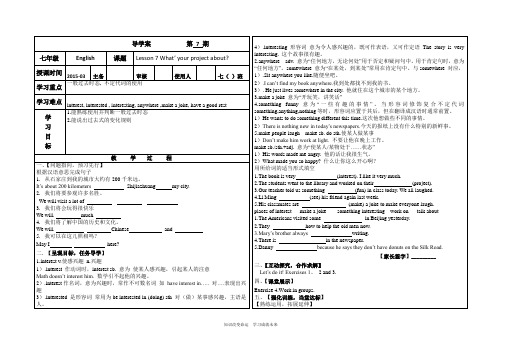
1.The Americans visited somein Beijing yesterday.
2.Theyhow to help the old men now.
1).Sit anywhere you like.随便坐吧。
2).I can’t find my book anywhere.我到处都找不到我的书。
3). He just lives somewhere in the city.他就住在这个城市的某个地方。
3.make a joke意为“开玩笑,讲笑话”
Jack: That’s a great idea.
Alan:Is 7:00 all right?
Jack: Could we make it a little later? I have to work until 6:30.
Alan: OK. What time do you want to meet?
四、【课堂展示】
Exercise 4.Work in groups.
五、【强化训练,当堂达标】
【熟练运用,拓展延伸】
单项选择
1.The story is _____________ and all of us are ___________ in it .
A interest, interesting B interesting , interest
3.Our teacher told us something(fun) in class today. We all laughed.
4.Li Ming(see) his friend again last week.
冀教版七年级下册英语导学案下lesson17导学案

玉门三中 七年级英语(下)导学案 主备人 李蔼芸 审核人 编号 NO.17 学生姓名: 班级: 等级 时间把规范修炼成一种习惯,把认真内化成一种性格课题lesson 17 A taxi to the Hotel【学习目标】1. Newwords: driver , translate surprised ,hey, drive ,quickly, another, slowly, 2 .Key sentences: (1) Let‟s take a taxi.(2) Don‟t translate for me. Please don‟t drive so quickly.(3) There are so many bicycles, cars and buses here. There is a bicycle! (4) The cars are quick. They go quickly. The bicycles are slow. They go slowly. 3.Important and difficult points:(1) Let‟s take a taxi.(2) Don‟t translate for me. Please don‟t drive so quickly.(3) There are so many bicycles, cars and buses here. There is a bicycle! (4) The cars are quick. They go quickly. The bicycles are slow. They go slowly. 【知识链接与探究】:1 . Please don‟t drive so quickly. 请不要开得太快。
祈使句的特点是以动词开头,其否定句是在句首直接加don‟t e. g : Please open your month and read after me. 请张开你的嘴跟我来读。
冀教版七年级下册英语导学案下lesson8导学案
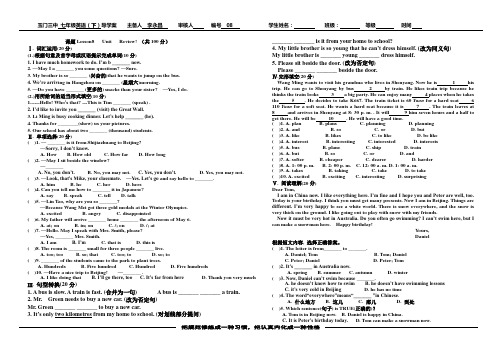
玉门三中 七年级英语(下)导学案 主备人 李永昌 审核人 编号 08 学生姓名: 班级: 等级 时间把规范修炼成一种习惯,把认真内化成一种性格课题Lesson8 Unit Review! (共100分)Ⅰ. 词汇运用(20分)(1.)根据句意及首字母或汉语提示完成单词(10分) 1. I have much homework to do. I’m b _______ now. 2. —May I a _______ you some questions? —Sure.3. My brother is so _______ (兴奋的)that he wants to jump on the bus.4. We’re arriv ing in Hangzhou on _______ (星期六)morning.5. —Do you have _______ (更多的) snacks than your sister? —Yes, I do. (2.)用所给词的适当形式填空(10分)1.-----Hello! Who ’s that? ---This is Tim _______ (speak) .2. I’d like to invite you _______ (visit) the Great Wall.3. Li Ming is busy cooking dinner. Let’s help _______ (he).4. Thanks for ________(show) us your pictures.5. Our school has about two _______ (thousand) students. Ⅱ. 单项选择(20分)( )1. — _______ is it from Shijiazhuang to Beijing? —Sorry, I don’t know.A. HowB. How oldC. How farD. How long ( )2. —May I sit beside the window? —_______A. No, you don’t.B. No, you may not.C. Yes, you don’t.D. Yes, you may not. ( )3. —Look, that’s Mike, your classmate. —Y es. Let’s go and say hello to _______. A. him B. he C. her D. hers ( )4. Can you tell me how to _______ it in Japanese? A. say B. speak C. tell D. talk ( )5. —Lin Tao, why are you so _______?—Because Wang Mei got three gold medals at the Winter Olympics. A. excited B. angry C. disappointed( )6. My father will arrive _______ home _______ the afternoon of May 6. A. at; on B. in; on C. /; on D. /; at ( )7. —Hello. May I speak with Mrs. Smith, please? —Yes, _______ Mrs. Smith.A. I amB. I’mC. that isD. this is( )8. The room is _______ small for three people _______ live. A. too; too B. so; that C. too; to D. so; to ( )9. _______ of the students came to the park to plant trees.A. HundredsB. Five hundredC. HundredD. Five hundreds ( )10. —Have a nice trip to Beijing! —_______ .A. I like doing thatB. I’ll go there, tooC. It’s far from hereD. Thank you very much Ⅲ. 句型转换(20分)1. A bus is slow. A train is fast. (合并为一句) A bus is _______ _______ a train.2. Mr. Green needs to buy a new car. (改为否定句) Mr. Green _______ _______ to buy a new car.3. It’s only two kilometres from my home to school. (对划线部分提问) _______ _______ is it from your home to school?4. My little brother is so young that he can’t dress himself. (改为同义句) My little brother is _______ young _______ dress himself.5. Please sit beside the door. (改为否定句) Please _______ _______ beside the door.Ⅳ.完形填空(20分)Wang Ming wants to visit his grandma who lives in Shenyang. Now he is 1 his trip. He can go to Shenyang by bus 2 by train. He likes train trip because he thinks the train looks 3 a big party. He can enjoy many 4 places when he takes the 5 . He decides to take K667. The train ticket is 60 Yuan for a hard seat 6 110 Yuan for a soft seat. He wants a hard seat because it is 7 . The train leaves at 8 and arrives in Shenyang at 8: 30 p. m. . It will 9 him seven hours and a half to get there. He will be 10 . He will have a good time.( )1. A. plan B. plans C. planning D. planning ( )2. A. and B. so C. or D. but( )3. A. like B. likes C. to like D. be like ( )4. A. interest B. interesting C. interested D. interests ( )5. A. bus B. plane C. ship D. train ( )6. A. but B. so C. or D. and( )7. A. softer B. cheaper C. dearer D. harder ( )8. A. 1: 00 p. m. B. 2: 00 p. m. C. 12: 00 a. m. D. 1: 00 a. m. ( )9. A. takes B. taking C. take D. to take ( )10. A. excited B. exciting C. interesting D. surprising Ⅴ. 阅读理解(20分) Dear Tom,I am in China now. I like everything here. I’m fine and I hope you and Peter are well, too. Today is your birthday. I think you must get many presents. Now I am in Beijing. Things are different. I’m very happy t o see a white world. There is snow everywhere, and the snow is very thick on the ground. I like going out to play with snow with my friends.Now it must be very hot in Australia. Do you often go swimming? I can’t swim here, but I can make a snowman here. Happy birthday!Yours, Daniel根据短文内容, 选择正确答案。
七年级英语冀教版下册下lesson26导学案
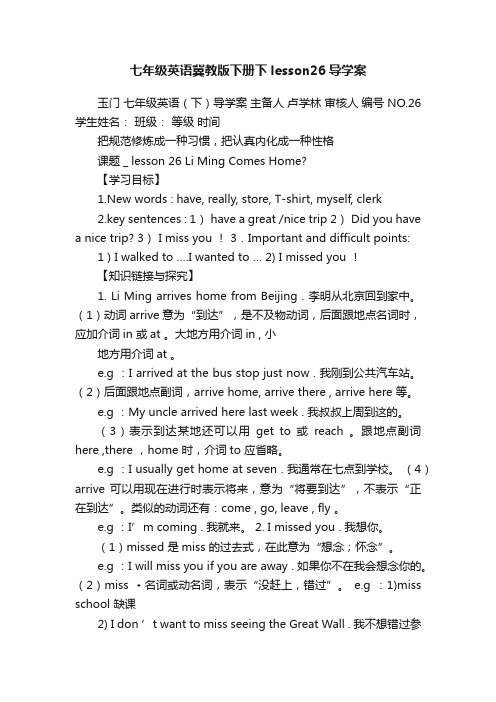
七年级英语冀教版下册下lesson26导学案玉门七年级英语(下)导学案主备人卢学林审核人编号 NO.26 学生姓名:班级:等级时间把规范修炼成一种习惯,把认真内化成一种性格课题_lesson 26 Li Ming Comes Home?【学习目标】1.New words : have, really, store, T-shirt, myself, clerk2.key sentences : 1) have a great /nice trip 2) Did you havea nice trip? 3) I miss you ! 3.Important and difficult points:1 ) I walked to ….I wanted to … 2) I missed you !【知识链接与探究】1. Li Ming arrives home from Beijing . 李明从北京回到家中。
(1)动词arrive 意为“到达”,是不及物动词,后面跟地点名词时,应加介词in 或at 。
大地方用介词in , 小地方用介词at 。
e.g :I arrived at the bus stop just now . 我刚到公共汽车站。
(2)后面跟地点副词,arrive home, arrive there , arrive here 等。
e.g :My uncle arrived here last week . 我叔叔上周到这的。
(3)表示到达某地还可以用get to 或reach 。
跟地点副词here ,there ,home 时,介词to 应省略。
e.g :I usually get home at seven . 我通常在七点到学校。
(4)arrive 可以用现在进行时表示将来,意为“将要到达”,不表示“正在到达”。
类似的动词还有:come , go, leave , fly 。
冀教版英语下册导学案
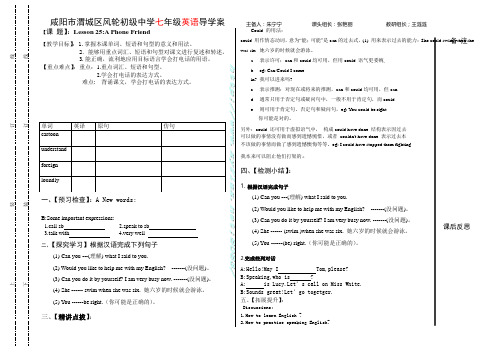
下装订线上装订线备 注课后反思【课 题】:Lesson 25:A Phone Friend【教学目标】:1.掌握本课单词、短语和句型的意义和用法。
2.能够用重点词汇、短语和句型对课文进行复述和转述。
3.能正确,流利地应用目标语言学会打电话的用语。
【重点难点】:重点:1.重点词汇、短语和句型。
2.学会打电话的表达方式。
难点: 背诵课文,学会打电话的表达方式。
一、【预习检查】:A New words:B:Some important expressions:1.call sb2.speak to sb3.talk with4.very well二、【探究学习】根据汉语完成下列句子(1) Can you ---(理解) what I said to you.(2) Would you like to help me with my English? -------(没问题)。
(3) Can you do it by yourself? I am very busy now. -------(没问题)。
(4) She ------ swim when she was six. 她六岁的时候就会游泳。
(5) You ------be right.(你可能是正确的)。
三、【精讲点拔】:Could 的用法:could swim when she was six. 她六岁的时候就会游泳。
a. 表示许可:can 和could 均可用,但用could 语气更委婉,b. eg: Can/Could I come in? 我可以进来吗?c. 表示推测:对现在或将来的推测,can 和could 均可用,但cand. 通常只用于否定句或疑问句中,一般不用于肯定句,而coulde. 则可用于肯定句、否定句和疑问句,eg: You could be right. 你可能是对的。
另外:could 还可用于虚拟语气中, 构成could have done 结构表示因过去 可以做的事情没有做而感到遗憾惋惜,或者 couldn't have done 表示过去本 不该做的事情而做了感到遗憾懊悔等等。
七年级英语冀教版下册Unit1_Lesson4_精品导学案
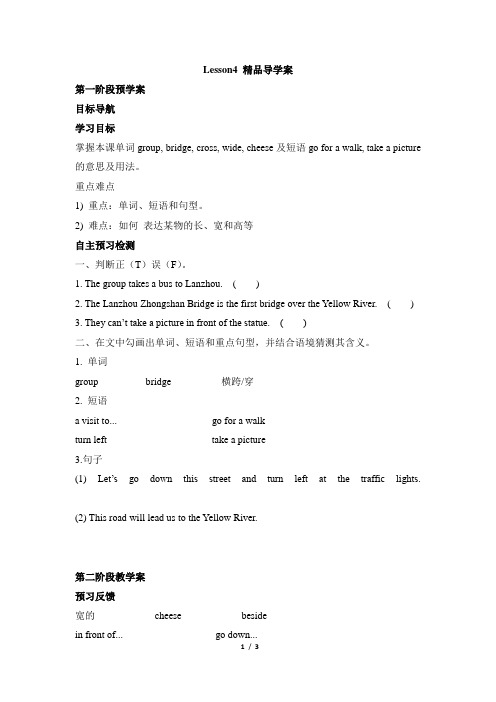
Lesson4 精品导学案第一阶段预学案目标导航学习目标掌握本课单词group, bridge, cross, wide, cheese及短语go for a walk, take a picture 的意思及用法。
重点难点1) 重点:单词、短语和句型。
2) 难点:如何表达某物的长、宽和高等自主预习检测一、判断正(T)误(F)。
1. The group takes a bus to Lanzhou. ( )2. The Lanzhou Zhongshan Bridge is the first bridge over the Yellow River. ( )3. They can’t take a picture in front of the statue. ( )二、在文中勾画出单词、短语和重点句型,并结合语境猜测其含义。
1. 单词group_________ bridge_________ 横跨/穿_________2. 短语a visit to..._______________ go for a walk ________________turn left________________ take a picture________________3.句子(1) Let’s go down this street and turn left at the traffic lights. _____________________________________________(2) This road will lead us to the Yellow River.____________________________________________第二阶段教学案预习反馈宽的_________ cheese_________ beside_________in front of... ________________ go down...________________It was the first bridge over the Yellow River.(翻译)___________________________________________精讲点拨1. over prep. 在......之上(1)It was the first bridge_______ the Yellow River.它是黄河上的第一座桥。
新冀教版七年级英语下lesson13导学案
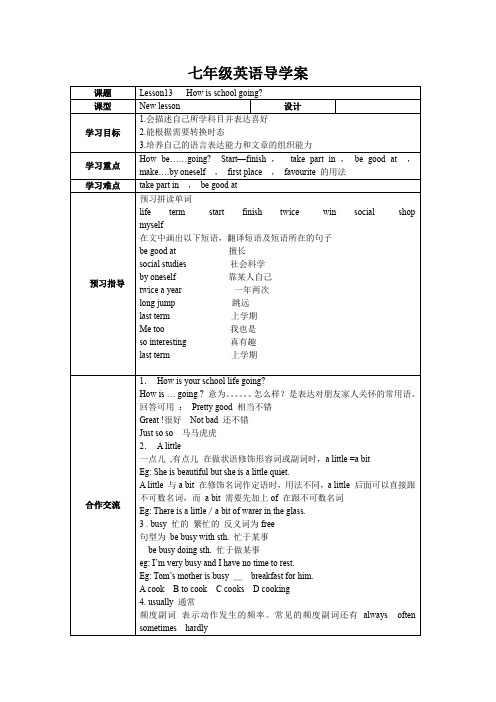
She is good at swimming. =She does well in swimming.
达标测评
用所给词的适当形式填空
1.Li Ming plays basketball(two) a week.
5.the child usuallyTV in the evening?
A.Is ,watching B.Are, watching C.Do , watches D.Does, watch
备注
Eg: Tom’s mother is busy_breakfast for him.
A cook B to cook C cooks D cooking
4. usually通常
频度副词表示动作发生的频率。常见的频度副词还有always often sometimes hardly
5、.take part in参加比赛,活动。He often takes part in the high jump.
twice a year一年两次
long jump跳远
last term上学期
Me too我也是so intereFra bibliotekting真有趣
last term上学期
合作交流
1.How is your school life going?
How is … going ?意为。。。。。。怎么样?是表达对朋友家人关怀的常用语。
2.I hope everything(go) well.
3.Can you finish(make) the model ship this morning?
- 1、下载文档前请自行甄别文档内容的完整性,平台不提供额外的编辑、内容补充、找答案等附加服务。
- 2、"仅部分预览"的文档,不可在线预览部分如存在完整性等问题,可反馈申请退款(可完整预览的文档不适用该条件!)。
- 3、如文档侵犯您的权益,请联系客服反馈,我们会尽快为您处理(人工客服工作时间:9:00-18:30)。
4 The coat is
(thousand )of yuan .
5 We go to school Monday(介词)
6 Do they go to school
Monday
Friday (介)
7 Mary is working hard English .
8 Let us go
(boat).
3
1. 知识与能力目标:学会一些国家和城市的英文名称,:会用所学知识,询问和回答人们来自哪里。 2. 过程与方法目标:学会理解和尊重异国文化. 3. 情感 态度与价值观目标:
【学法指导】
1、联系生活学习英语。敢于用英语表达,用英语进行交际。 2、听力策略:A. 放松心情。B. 注意关键字
【学习重点】
【学习难点】
7 From A to B 从 A 到 B . 8 Work hard at A 努力干 A(介+ doing ) 9 Too many +可数名词的复数。 Too much +不可数名词
10 live in + 大地方(城市) Live at + 小地方(农村)
二、 重点知识点巩固练习
1 He may
【学习过程】
一、预习指导与检测 (一) 预习指导
1.预习第 1-2 页的生词,根据音标会读知意. 2.朗读第 1-2 页的句型,能英汉互译.
(二) 知识点拨
1 Go on a trip to A 去 A 地旅行 .2 May 表示允许,无人称和数的变化. 3 Too+ 形/副 to do sth 表示否定的含义, 是太… 不能干. 4Be busy doing sth(动名词) 是忙于做某事,就等于 be busy with sth (名词) 5 A be far from (away) A 离 B 远 6Two hundred / thousand / million/ billion 两百/千/ 百万/亿 Hundreds/ thousands / millions/ billions of 成百/千/百万/亿
2)讨论:中国、日本、美国、加拿大、澳大利亚、英国、法国、新加坡等的国家名称、
首都等形式,并展开小组竞赛,看看那组最棒。
3) 讨论:询问某人来自哪里了解 be from 与 come from 区别。
5 live 后何时用 in,何时不用 in。整理到笔记本上。
四、当堂检测 (一)轻松闯关﹙基础题﹚
冀教版七年级英语下册导学案 Unit 8 Summer Holiday Is Coming! lesson 43 Have a Good Summer ! 【学习目标】
1. 知识与能力目标:学会一些国家和城市的英文名称,:会用所学知识,询问和回答人们来自哪里。 2. 过程与方法目标:学会理解和尊重异国文化. 3. 情感 态度与价值观目标:
(二)能力提升﹙能力题﹚
(三)快乐拓展﹙拓展题﹚
五、总结与反思
1、我的收获:Words and expressions: Sentences
学习本节后,我能用英语进行 。 2、我的易错点: 。 3、我需要提高的是:
2
lesson 44 Volunteering in Summer ! 【学习目标】
【学法指导】
1、联系生活学习英语。敢于用英语表达,用英语进行交际。 2、听力策略:A. 放松心情。B. 注意关键字
【学习重点】
【学习难点】
【学习过程】
一、预习指导与检测 (一) 预习指导
1.预习第 1-2 页的生词,根据音标会读知意. 2.朗读第 1-2 页的句型,能英汉互译.
(二) 知识点拨
1 Go on a trip to A 去 A 地旅行 .2 May 表示允许,无人称和数的变化. 3 Too+ 形/副 to do sth 表示否定的含义, 是太… 不能干. 4Be busy doing sth(动名词) 是忙于做某事,就等于 be busy with sth (名词) 5 A be far from (away) A 离 B 远 6Two hundred / thousand / million/ billion 两百/千/ 百万/亿 Hundreds/ thousands / millions/ billions of 成百/千/百万/亿 7 From A to B 从 A 到 B . 8 Work hard at A 努力干 A(介+ doing ) 9 Too many +可数名词的复数。 Too much +不可数名词
1
7 Mary is working hard English .
8 Let us go
(boat).
9 Let us go to the park
(play).
There are too
(much/many) people in the .Par
三、课堂互动探究
1. 小组活动:
1) 共同总结本节课的重点单词及短语,然后互相提问。
(go) home
————————————————一 (一般疑问句)
—————————————————(否定句)
2 He wants (go) a trip Beijing.
3He is too young
(go) to school. He is too old to
(climb ) the tree .
10 live in + 大地方(城市) Live at + 小地方(农村)
二、 重点知识点巩固练习
1 He may
(go) home
————————————————一 (一般疑问句)
—————————————————(否定句)
2 He wants (go) a trip Beijing.
3He is too young
(go) to school. He is too old to (climb ) the tree .
4 The coat is
(thousand )of yuan .
5 We go to school Monday(介词)
6 Do they go to school
Monday
Friday (介)
9 Let us go to the park
(play).
There are too
